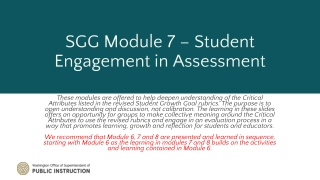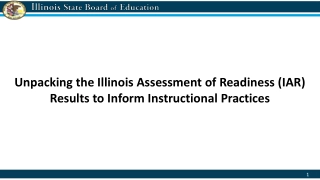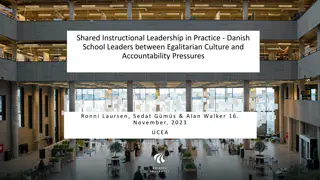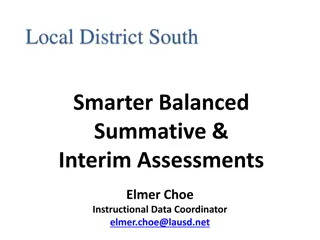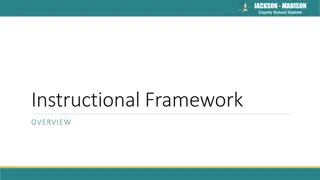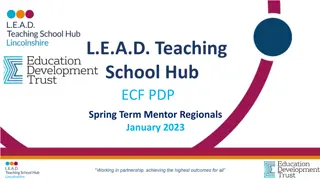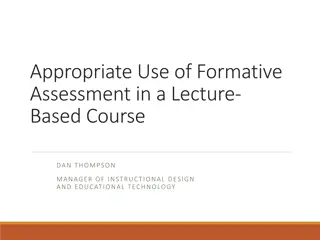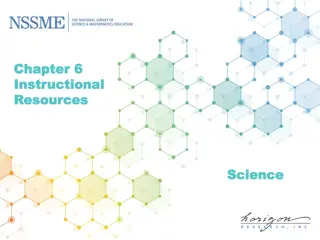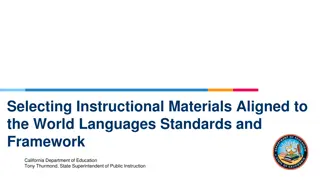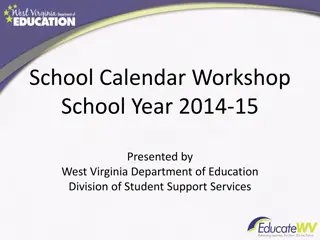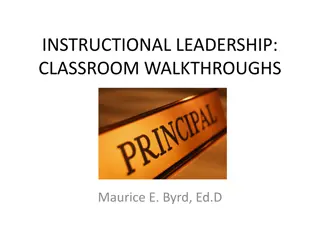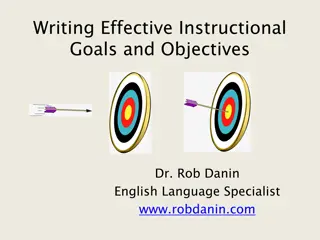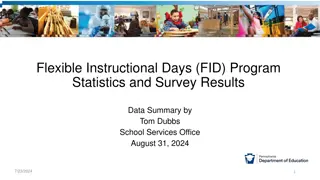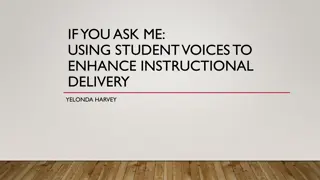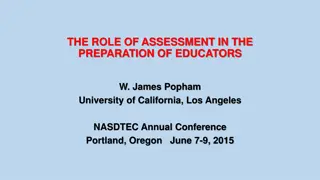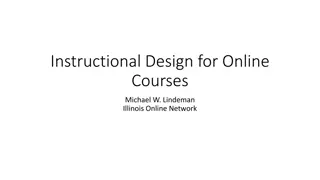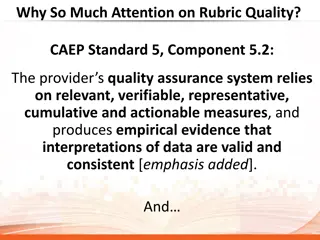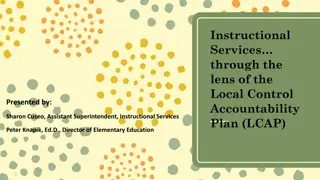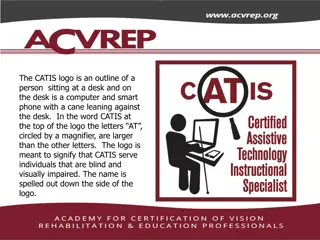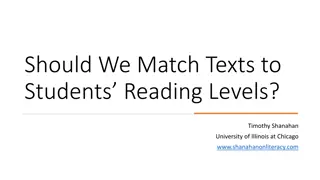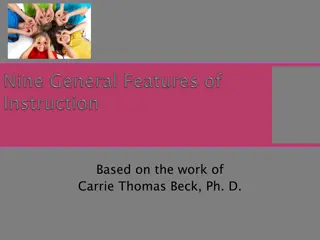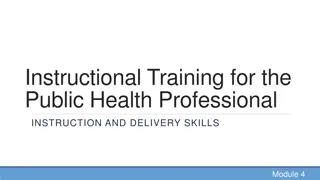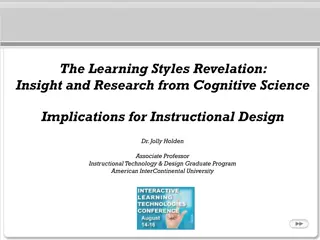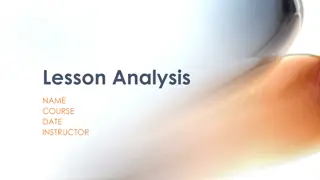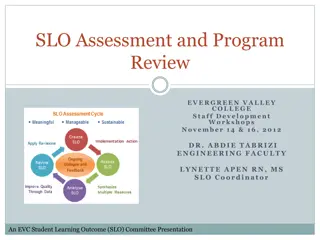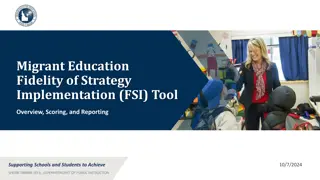SGG Module 7 – Student Engagement in Assessment
Strategies and benefits of student engagement in assessment. Learn to connect formative assessment to student growth conversations and instructional frameworks while promoting student voice and self-reflection. Build understanding and skills for effective assessment practices.
2 views • 24 slides
Unpacking the Illinois Assessment of Readiness (IAR) Results for Instructional Enhancement
This informative content discusses a workshop aimed at helping district/school teams analyze IAR results to identify trends, enhance instructional practices, and plan for student improvement. Key topics include workshop goals, resources, and the purpose and intended uses of the IAR results.
0 views • 52 slides
Exploring Shared Instructional Leadership in Danish Schools
This study delves into how principals implement shared instructional leadership in Danish primary and lower secondary public schools, aiming to enhance dialogue on its potential in diverse cultural contexts. The Danish educational landscape, emphasizing autonomy and democratic participation, poses c
1 views • 14 slides
Academic Progress Monitoring for Effective Instructional Planning
Academic progress monitoring involves measuring student performance to evaluate responsiveness to interventions, guide instructional decisions, and determine when adjustments are necessary. It helps identify students needing additional support, compare instructional effectiveness, decide on changes,
2 views • 44 slides
Sheffield Early Help Assessment Form Update and Integration with Extended Support Plan
Sheffield has introduced an updated Early Help Assessment form to streamline the assessment process within the Early Help System. This new form combines the Early Help Assessment with the Extended Support Plan, aligning various assessment tools and referral forms into one comprehensive document. The
5 views • 22 slides
Behavior Progress Monitoring for Individualized Instructional Planning
Utilizing behavior progress monitoring allows educators to track student performance over time, make data-informed decisions to improve responsiveness to interventions, and tailor instructional plans for individual students. This comprehensive approach involves steps such as setting the stage, analy
6 views • 52 slides
Enhancing Language Learning Through Peer Assessment
Explore the benefits of peer assessment as a valuable tool for language learning, comparing it with self-assessment. Discover the components and challenges of self-assessment, along with the potential of peer assessment to improve accuracy and promote self-regulation. Gain insights into what peer as
3 views • 29 slides
Understanding SBAC Summative and Interim Assessments for Instructional Decision Making
Resources and insights are provided for interpreting SBAC summative assessment results and using interim assessments to enhance instructional and curricular strategies. Explore California Assessment of Student Performance and Progress (CAASPP) reporting, scaled scores, achievement levels, assessment
0 views • 60 slides
Overview of DSW End Point Assessment Team Leader Level 3
DSW End Point Assessment Team Leader Level 3 provides a clear understanding of the assessment process, ensuring individuals comprehend why and when it occurs, responsibilities involved, and how DSW supports them. It covers topics such as what End Point Assessment entails, assessment design and deliv
1 views • 18 slides
Jackson-Madison County School System Instructional Framework Overview
In the Jackson-Madison County School System, the focus is on a research-based instructional framework consisting of curriculum, lesson structures, and authentic literacy. Emphasizing the importance of a content-rich curriculum, effective teaching practices, and purposeful literacy, the district aims
0 views • 37 slides
Professional Development Workshop Series on Instructional Coaching and Mentorship
Explore the world of instructional coaching and mentorship in education through a series of workshops focusing on deepening coaching practices, self-reflection, key aspects of coaching, and transactional analysis. Led by expert facilitators, participants will develop their coaching skills and foster
1 views • 28 slides
Enhancing Student Learning Through Formative Assessment in Lecture-Based Courses
Formative assessment is a crucial tool for improving student outcomes in lecture-based courses. It allows educators to evaluate comprehension, identify learning needs, and adjust instruction to enhance student understanding. This article explores the methods, benefits, and implementation of formativ
1 views • 14 slides
Science Instructional Resources Usage in Elementary and Middle School Classes
Explore the utilization of instructional resources in science classes across elementary and middle schools. The data showcases the distribution of various types of resources such as textbooks, kits/modules, online units, and more designated for educational purposes. Discover the percentage breakdown
0 views • 52 slides
Understanding Assessment in Medical Education
Exploring the concepts of assessment in medical education, including defining assessment, types of assessment, reliability, validity, and aligning assessment methods with intended learning outcomes. The importance of constructive alignment and the impact of assessment on learning outcomes are also d
1 views • 12 slides
World Languages Instructional Materials Evaluation Framework
This comprehensive guide provides insights into evaluating instructional materials aligned with the World Languages Standards. Topics include criteria for selecting materials, review of adopted programs, and guidance on the adoption process. The framework covers various chapters outlining standards,
0 views • 28 slides
Assessment Matters in Sociology: Enhancing Learning Through Evaluation
Explore the significance of assessment in sociology education, focusing on key questions to evaluate current assessment procedures, review individual course assessments, and develop strategies to enhance student learning outcomes. Delve into the centrality of assessment in the learning process, with
1 views • 15 slides
Insights into Managing Assessment in the Classroom by Assessment Research Group
Explore the importance of standards and assessment in education through the lens of the Assessment Research Group. Gain valuable perspectives on curriculum delivery, understanding the assessment system, learner assumptions, task parameters, and more. Discover how language, structure, and agency play
2 views • 25 slides
Enhancing Understanding through Assessment in Educational Design Workshop
Learn and collaborate on assessment practices in education design at the "Understanding by Design Assessment Focus" workshop. The agenda includes sessions on summative and formative assessment, feedback, reporting, and more. Engage in activities like generating questions, finding destination partner
1 views • 76 slides
Legislative Changes in School Calendar Policies
Significant legislative revisions were made to school calendar statutes in West Virginia during the 2013 legislative session, allowing more flexibility for county boards to develop calendars while ensuring a minimum of 180 instructional days. The changes mandated public hearings, set guidelines for
1 views • 63 slides
Institutional Assessment Planning Workshop Feedback and Insights
Feedback and insights from a recent institutional assessment planning workshop led by Dr. Mark Nicholas at FSU S. Warren Conference Center & Inn. Participants provided feedback on the usefulness of the content, presenter knowledge, ability to develop assessment plans, post-training assessment knowle
1 views • 9 slides
Understanding Higher Education Assessment: The Complete Guide
Higher education assessment involves a systematic process of collecting, reviewing, and utilizing information to improve student learning and development. This guide covers the assessment cycle, learning outcomes, the mission behind assessment in higher education, what assessment is and is not, reas
1 views • 36 slides
Enhancing Instructional Leadership Through Classroom Walkthroughs
Effective instructional leadership in schools involves principals taking on roles as instructional leaders through classroom walkthroughs. These walkthroughs help assess teaching strategies, student engagement, and classroom practices, leading to improved learning outcomes. By focusing on key compon
0 views • 7 slides
Writing Effective Instructional Goals and Objectives in Education
Determine the importance of setting clear instructional goals and objectives for effective lesson planning in education. Explore the difference between goals and objectives, understand how to write instructional goals, and learn to create specific, measurable instructional objectives for student ach
0 views • 12 slides
Flexible Instructional Days (FID) Program Overview
The Flexible Instructional Days (FID) Program allows schools to provide remote instruction on days when traditional delivery is not feasible. Schools must apply to the Pennsylvania Department of Education (PDE) to participate in the program, which requires approval by the entity's governing body. FI
0 views • 25 slides
Overview of Environmental Impact Assessment and Strategic Environmental Assessment Directives
Environmental Impact Assessment (EIA) and Strategic Environmental Assessment (SEA) play crucial roles in evaluating the impact of planned activities on the environment. This content delves into the concept, origins, development, and key elements of environmental assessment, discussing the legal fram
2 views • 35 slides
Enhancing Instructional Delivery Through Student Voices: A Study by Yelonda Harvey
Yelonda Harvey conducted a study at a Title I school in Ward 7 to investigate the impact of different instructional strategies on students' academic progress. The research involved administering questionnaires to fifth-grade science students, focusing on student preferences for various teaching moda
0 views • 16 slides
The Role of Assessment in Educator Preparation: Key Issues and Solutions
Focus on assessment in preparing educators, highlighting key problems faced in assessment literacy and formative assessment. Discusses the adverse effects of assessment naivete and the importance of instructional sensitivity in educational testing.
0 views • 31 slides
Institutional Assessment and Effectiveness Workshop Achievements at SUNY Oneonta
The Office of Institutional Assessment and Effectiveness at SUNY Oneonta has made significant progress in developing assessment protocols and processes, leading to a culture of assessment. This includes completing planning and assessment cycles, establishing objectives and procedures, and aligning u
1 views • 16 slides
Effective Strategies for Online Course Development
Instructional Design for Online Courses by Michael W. Lindeman presents valuable insights into the systematic process of translating learning principles into instructional materials. It covers differences between face-to-face and online course planning, considerations for online course development,
0 views • 27 slides
Enhancing Rubric Quality in Educational Assessment
The focus on rubric quality in education, particularly in meeting CAEP Standard 5, Component 5.2 for quality assurance systems, is crucial for generating valid, reliable, and actionable data. CAEP now allows early submission of assessment instruments to improve data quality. However, common weakness
0 views • 22 slides
Overview of Instructional Services through LCAP
Explore how Instructional Services, including Elementary Education, Special Education, Child Development, Instructional Technology, Arts & Career Technical Education, and Induction programs, are structured and evaluated within the context of the Local Control Accountability Plan (LCAP). The organiza
0 views • 38 slides
Certified Assistive Technology Instructional Specialists for Individuals with Visual Impairments
CATIS, Certified Assistive Technology Instructional Specialists, empower individuals who are blind or visually impaired to achieve their life goals through the use of assistive technology. They engage in vision rehabilitation, offer expertise in assessment, instruction, configuration, and exploratio
0 views • 22 slides
Reconsidering the Matching of Texts to Students' Reading Levels
The prevailing belief that instructional materials should be tailored to students' reading levels to enhance learning may not be as effective as commonly thought. Contrary to this idea, evidence suggests that such text placements can hinder rather than facilitate student reading achievement. The his
0 views • 45 slides
Effective Instructional Strategies for Engaging Students
Instructional tasks are modeled appropriately, explicit instruction is provided, and students are engaged in meaningful interactions. Opportunities for practice and corrective feedback are given, while encouraging student effort and success. Demonstrations and step-by-step guidance help students lea
0 views • 58 slides
Instructional Training for Public Health Professionals Module 4
This module focuses on enhancing instructional and delivery skills for public health professionals. Participants will learn to identify factors for effective delivery, recognize positive presentation skills, and describe tools used in instructional settings. Topics covered include instructor aptitud
0 views • 23 slides
Learning Styles and Instructional Design: Debunking Misconceptions
The concept of learning styles as predictors of learning outcomes is widely misunderstood. Research shows little impact on learning outcomes. This presentation explores the implications for instructional design and questions the relevance of considering learning styles as a variable in instructional
0 views • 56 slides
Jackson-Madison County School System Instructional Framework Overview
The Jackson-Madison County School System focuses on engagement through a research-based instructional framework centered on curriculum, lesson structures, and authentic literacy. Emphasizing the importance of a content-rich curriculum and effective teaching practices, the district aims to improve in
0 views • 26 slides
Comprehensive Analysis of Instructional Model and Engagement in a Lesson
This analysis examines the instructional models exhibited by a teacher during a lesson, focusing on engagement and strengths. Recommendations for potential improvements are also discussed. The content includes images and discussions on identifying instructional models, strengths of the lesson, and r
0 views • 6 slides
Evergreen Valley College Staff Development Workshop on SLO Assessment and Program Review
This workshop conducted at Evergreen Valley College focused on integrating Student Learning Outcome (SLO) assessment with program review processes to identify and implement program improvements. Participants learned how to utilize assessment data to modify instruction, integrate SLO assessment into
0 views • 12 slides
Overview of Migrant Education Fidelity of Strategy Implementation (FSI) Tool
The Migrant Education Fidelity of Strategy Implementation (FSI) Tool is designed to evaluate and ensure the proper implementation of strategies in the Idaho Migrant Education Program (MEP). It aims to measure the fidelity of services delivered, provide a self-assessment guide for local MEPs, and sup
0 views • 19 slides
